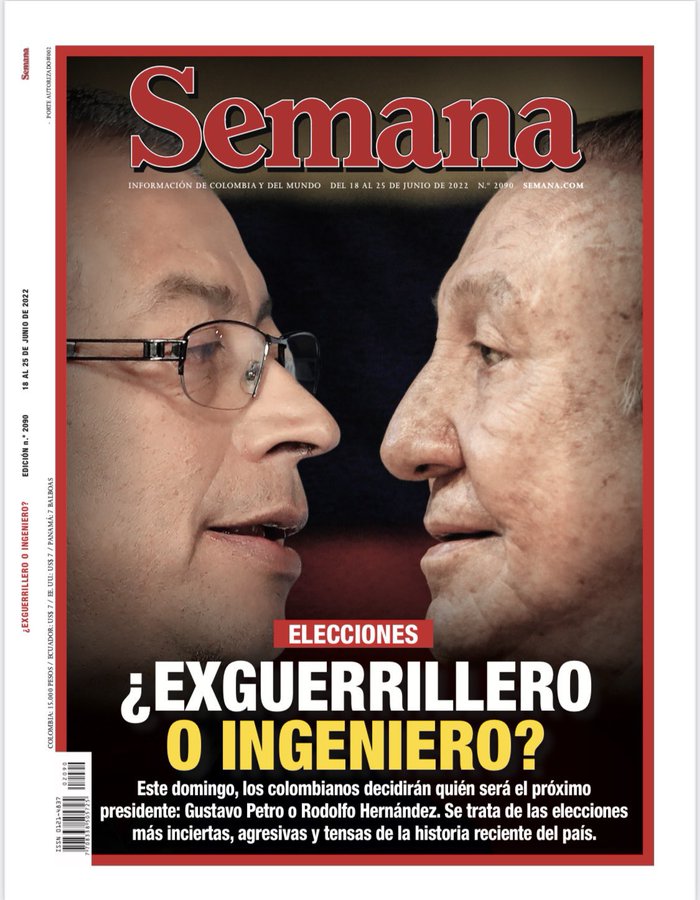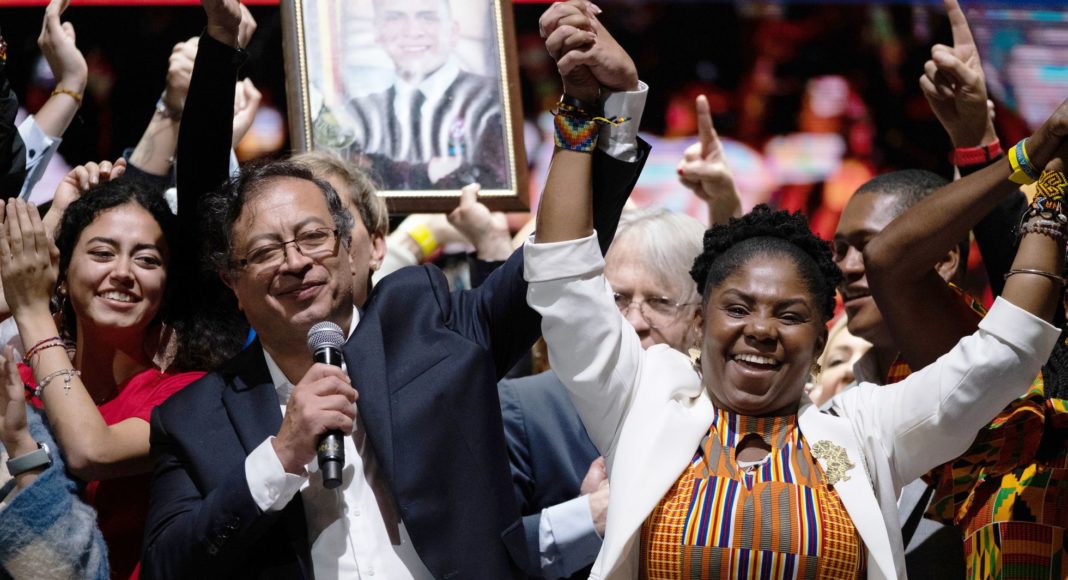This opinion piece was originally published in Universidad de Los Andes’ publication, 070. It was translated for LAB by Valentina Hernández.
Just one day before Colombians turned out to vote for their next president, Semana, a media outlet that has devoted itself to serving the interests of Uribismo and big business, posed the question on their magazine cover: ¿Exguerrillero o Ingeniero? – Former guerrilla member or engineer? (Gustavo Petro or Rodolfo Hernández).
Despite everything – the media, the fear mongering, the status quo – Petro won.

The cover said it all, defining the candidate solely by his past as a guerrillero. ‘Journalism’ captured it all: a director yelling that this was a matter of ‘lefties’, that to be of the political left is to ‘smell bad’ and ‘dress poorly’.
The gente de bien (self-described ‘good people’ in Colombia, better translated as ‘elites’) insinuated their future lay in Miami if communism were to be allowed to conquer. And yet, against everyone and everything, including history itself, Petro won. Some might argue that he’s of the left, while others say that he’s just more of the same. But for Colombia this is something different: the ‘ugly’ one, the ‘other’, the one who chose an Afro-Colombian woman (Francia Márquez Mina) as vice president, has won the elections.
Only time will tell if we’ll do it right, or at least differently. It’s fair to say that the bar has been lowered considerably by the most inept president in Colombian history, Iván Duque.
The Colombian people are fed up, angry, outraged, and tired. What’s incredibly bizarre is that polling firm Yanhass published a poll on June 11 with the question: ‘Do you believe your life and your family’s lives are on track?’ 91 percent of respondents affirmed that they feel optimistic. So, who is it exactly that Colombians are resenting?
Who? Duque, whose historically indifferent government was cynical of the needs and struggles of its citizens. As one of his last public provocations, Duque dared to say that he would have won had he run for re-election, even if most polls give him just a 20 percent approval rating among respondents.
And who else? The politicians who committed themselves to doing nothing, alongside the Ministry of Defence and the ESMAD (riot police), responsible for massacring farmers and presenting them as guerrilla members, as well as the murder of more than 80 people during the national strike of 2021.
People are fed up and this is what led to the 40-day social uprising in 2021. ‘La gente no aguanta más’, people can’t bear it anymore – you hear it on the streets, from the taxi driver, the single mother, the entrepreneur with no government support, and the working-class employee. We are tired of Duque and the politicians, we are tired of the media that is supposed to hold power to account but doesn’t even try to do so, and we are even more tired of businessmen who only care about profit.
We were fed up, and Petro came along with a supposedly ‘leftist’ discourse, amorphous and rhetorical and even incomprehensible, yet he had change as his banner. Petro embodied the popular candour of young people, that of the neighbourhoods and the streets.
He was a politician, but unlike the others. He didn’t think Colombia was meant to subordinate its interests to those of the USA and businessmen. Inevitably, that promise of change was strengthened by a Black woman, Francia Marquez, who’s in sync with the pains of ‘los nadies’, the nobodies 1)The expression ‘los/las nadies’ was first coined by the writer and journalist Eduardo Galeano, making reference to the forgotten classes and those of lower social status. He defined the term through a poem in his book Las venas abiertas de América Latina., who prioritizes the fight to protect the environment, who dares to think like a woman – that is, to defend social justice, seek a better life for the youth, and ‘Vivir sabroso’ (to live with dignity and without fear, in a peaceful country).
And everything was going well. The right wing was proposing more Duque (with their candidate nicknamed Fico), which is to say, more of the same old. The media, the candidates, the elites, and the establishment were gathering against Petro. One voice and one agenda encompassed a single campaign: ‘We must all stop Petro’. And they had to stop him because of his past in the M-19 guerrilla. It didn’t matter that he’s had a civil life for over 30 years now, that he has been a congressman, and occupied the highest office as mayor of Bogotá. His only identity to them was guerrillero.
Then the primaries came, and an angry, profane old man and loan shark came in second behind Petro. He made it into the final round. Funnily enough, he also embodied change. The media quickly fell in love with his bluntness and charisma, his boldness to say things like ‘I welcome the holy Virgin and all the prostitutes that live in her neighbourhood’, ‘I use the law as toilet paper’, or ‘All public servants and corrupt and lazy’, or ‘Picture this…a little man paying me interest for 15 years, that’s the dream.’ We could go on, and mention that the candidate had no idea what the Escazú accords were, that he confused Einstein with Hitler, the OAS with the UN…
His manner of speaking, his ignorance of democracy and its institutions, his ‘honesty’, channelled the anger people felt against politicians and Duque.
The gente de bien, the ‘new money’, the ones that know Miami better than they do their own country, as the German ambassador in Colombia put it, were also charmed. The same people that believe that Colombia could actually turn into Venezuela (when with Duque we ended up there: the President and his cronies mishandled both justice and legislation to prosecute the opposition); those who think that communism is alive and called ‘feminism’; those who think that our only issue is the guerrilla… Those racist and classist machos were enamoured by his coarse discourse.
Suddenly, Petro – who had been a politician – was no longer dangerous because of his ‘communist’ and ‘guerrillero’ past, but because now he somehow represented the establishment that needed to be changed. That is to say, he was part of what needed changing. Rodolfo embodied true change, while Petro was more of the same old politics.
The political right, the media, the frightened citizens and the ‘gente de bien’ were all aboard the Rodolfo train. He did whatever he wanted: he conceded to the interviews he asked for, he hid away in Miami, didn’t attend any debates, and avoided any questions or accusations about his machismo, corruption, or antidemocratic manoeuvres.
Petro was no longer the change. He was looking lost and adrift against the hysteric fierceness of Rodolfo, so deeply loved by the media. Journalists no longer knew what to do. They kept on selling us the idea that this election was worse than any presidential election in history. And that, of course, the future would be terrible.
And yet, despite everything and everyone, and against the establishment, Petro won. There is history in the making in Colombia.
Featured image: Santiago Mesa
Omar Rincón has a PhD in Social Sciences from the National University of Colombia. He currently works as a lecturer at the Universidad de los Andes in Bogotá, Colombia. He’s an academic, artist, essayist and journalist. He’s had his texts published in media outlets such El Tiempo and 070.
Valentina Hernández Gomez is a Colombian student of Journalism at the University of the West of England, she is Climate and Sustainability Editor at Bristol247 and a LAB intern.
References
| ↑1 | The expression ‘los/las nadies’ was first coined by the writer and journalist Eduardo Galeano, making reference to the forgotten classes and those of lower social status. He defined the term through a poem in his book Las venas abiertas de América Latina. |
|---|

